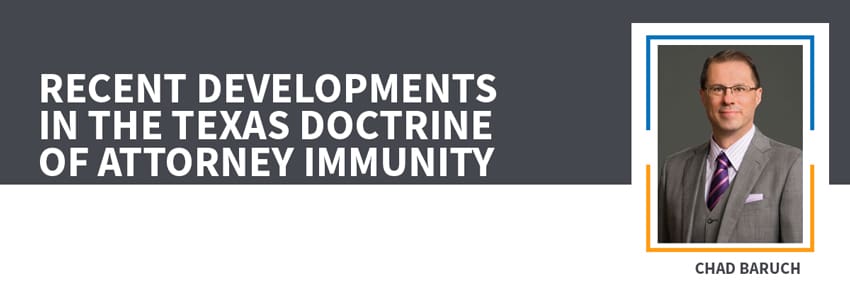
Attorney immunity doctrine is a hot topic in Texas law. The Texas Supreme Court of Texas has issued two opinions on the doctrine in the past four terms, and the Fifth Circuit has issued two opinions on it since January 2019. As a result of these opinions, we now have a much better idea of the contours of attorney immunity in Texas.
Stated broadly, the attorney immunity doctrine prohibits a litigant from suing opposing counsel. This general principle has been entrenched in Texas law for decades. But while the general principle of attorney immunity was well established, there was a long-simmering debate among Texas intermediate appellate courts over the existence of an exception to the rule for attorney conduct alleged to be criminal or fraudulent. Several courts recognized this crime/fraud exception to attorney immunity.
In 2015, the Texas Supreme Court clarified the law of attorney immunity with its decision in Cantey Hanger, L.P. v. Boyd. There, the Court rejected the notion of any blanket exemption for criminal or fraudulent activity. The Court instead explained that attorney immunity turns on the kind—and not the nature—of any attorney’s conduct. The Court held that attorney immunity applies to any acts taken within the scope of client representation, so long as those acts are not foreign to the duties of an attorney. Addressing the potential fraud exception, the Court held that it “would significantly undercut the defense,” and concluded that “[m]erely labeling an attorney’s conduct ‘fraudulent’ does not and should not remove it from the scope of client representation or render it ‘foreign to the duties of any attorney.’”
The Court reiterated this holding three years later in Youngkin v. Hines, explaining that:
In Cantey Hanger, we explained that an attorney is immune from liability to non-clients for conduct within the scope of his representation of his clients. Put differently, an attorney may be liable to non-clients only for conduct outside the scope of his representation of his client or for conduct foreign to the duties of a lawyer. We also clarified in Cantey Hanger that the above inquiry correctly focuses on the kind of conduct at issue rather than the alleged wrongfulness of said conduct, that is, a lawyer is no more susceptible to liability for a given action merely because it is alleged to be fraudulent or otherwise wrongful.
(internal citations omitted).
The Fifth Circuit Court of Appeals has issued two major decisions concerning the Texas attorney-immunity doctrine during 2019. In Iron Horse Europe DAC v. Schiff Hardin, the Fifth Circuit jettisoned what previously had appeared to be an established exception to attorney immunity in Texas. In 1999, the Texas Supreme Court held that a litigant could sue opposing counsel for negligent misrepresentation in McCamish, Martin, Brown & Loeffler v. F.E. Appling Interests. The Court then cited McCamish favorably in Cantey Hanger. Most observers thus believed the McCamish exception continued to be valid. But the Fifth Circuit said otherwise in Iron Horse. Declining to certify the question, the Fifth Circuit instead made an “Erie guess” and concluded that “the Supreme Court of Texas would extend immunity to . . . negligent misrepresentation.” Down goes McCamish!
The Fifth Circuit issued another major attorney-immunity decision in Troice v. Greenberg Traurig, L.L.P. There, the Fifth Circuit addressed three questions left unanswered by Cantey Hanger. The court concluded that (1) attorney immunity applies in the nonlitigation context, (2) there is no categorical exemption to the doctrine for alleged criminal activity (instead, applicability of the doctrine turns on whether the conduct at issue was within the scope of the attorney’s representation), and (3) the doctrine has not been abrogated by the Texas Securities Act.
The cumulative effect of these decisions is that attorney immunity in Texas is nearly absolute.
